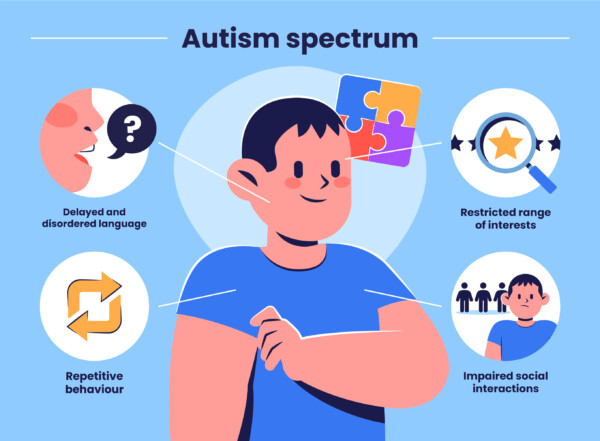Complete Guide: Autism Symptoms in Adults Checklist: Orlando Counselor
Autism Symptoms in Adults Checklist: A Complete Guide
Autism Spectrum Disorder (ASD) is a developmental condition that affects millions of adults across the United States, presenting unique challenges in social communication, behavior, and daily functioning.
Recent estimates suggest that approximately 2.21% of adults in the US live with ASD, which is around 5.4 million individuals! This prevalence highlights the importance of awareness and understanding of autism symptoms in adults, as many remain undiagnosed or misidentified.
As awareness of autism continues to grow, recognition of the fact that symptoms can manifest differently in adults compared to children is also increasing. Research indicates that autism is nearly four times more common in men than in women, and symptoms can often be subtle, making accurate identification crucial for obtaining appropriate support and resources.
This article provides a checklist of adult autism symptoms to help individuals and professionals recognize and address their needs more effectively. By understanding these symptoms, you can improve outcomes in areas like employment, social relationships, and overall quality of life for autistic adults.
How do you recognize autism symptoms in adults?
Recognizing autism spectrum disorder (ASD) in adults can be tricky. It can show up in different ways compared to children. Sometimes, the signs are missed or mistaken for other issues. Adults might also hide their challenges with coping mechanisms. Because of this, it is essential to know the signs and symptoms of adult autism. This helps in self-identification and raises awareness.
The symptoms of ASD usually involve social interaction, communication styles, sensory processing, and repetitive behaviors. It is vital to remember that the autism spectrum is broad. Not everyone will have all symptoms or feel them in the same way.
What are the core symptoms of autism?
One of the common symptoms of autism in adults is difficulty in handling social situations, often needing time to process conversations and respond adequately. Understanding nonverbal cues, like body language and facial expressions, can also be a struggle, making it hard to gauge others’ emotions.
As a result, your straightforward communication style might be perceived as rude, leading to misunderstandings and challenges in building relationships. Neurotypical peers may not realize why you struggle with social cues, often lacking the patience to accommodate you.
Common symptoms include:
- Feeling anxious in large groups.
- Difficulty forming and maintaining friendships.
- Uncertainty about appropriate behavior in social contexts.
- Misinterpretation of social cues, resulting in awkward interactions.
Let’s understand more symptoms that will help identify adult symptoms in adults with a checklist.
-
Sensory overload
You may experience discomfort with various sensory inputs—like fabrics, sounds, and smells—leading to overwhelm, especially in noisy environments. This can make daily tasks challenging, causing you to feel burnt out or need solitude to recharge.
Typical experiences involve:
- Distress in crowded places.
- Difficulty tolerating certain textures or scents.
- Overstimulation that requires time alone.
- Repetitive behaviors and interests
If routines and specific interests provide comfort, this may reflect autistic traits. Many find solace in structure and have intense passions. Stimming—like hand-flapping or rocking—serves as a method of self-regulation.
Examples include:
- Establishing daily routines.
- Deep knowledge of specific subjects.
- Using repetitive actions to focus or calm yourself.
- Autistic burnout
Autistic burnout is a state of intense exhaustion from navigating a world that often lacks understanding. It can manifest as:
- Persistent fatigue.
- Heightened emotional sensitivity.
- Reduced motivation for enjoyable activities.
- Masking
Masking involves hiding your true self to fit societal norms, which can be exhausting. It may include:
- Mimicking neurotypical behaviors to blend in.
- Suppressing stimming or specific interests.
- Constantly monitoring your actions to avoid standing out.
How important is understanding adult autism?
Recognizing autistic traits can help people accept themselves and feel good about their differences. This understanding can lead to more compassion from family, friends, and employers.
Getting a formal diagnosis can open doors to support services made for autistic adults. These services can include social skills training, help with finding a job, and therapies for issues like anxiety or depression.
In the end, raising awareness about adult autism helps us build a society that accepts everyone. With the proper support, individuals can do well and feel included.
What are the communication challenges in autistic adults?
Communication can be a big challenge for adults with autism spectrum disorder (ASD). It requires understanding both spoken words and body language. This can be hard for many individuals with autism.
Adults with autism often face misunderstandings and feel that others do not understand them. Let’s see how talking and body language affect adult autism.
-
Verbal communication nuances
Autistic adults often have unique ways of talking. Some may use a monotone voice, which means they do not change their pitch to show feelings. Others take words literally and may have trouble understanding metaphors, idioms, or sarcasm.
They might need help sharing speaking time in conversations. Starting and keeping a conversation going can feel challenging, which can lead to social anxiety and a desire to avoid these situations.
Both autistic individuals and others need to understand these differences in communication. By being aware of these patterns, we can help create better, more caring communication methods.
-
Non-verbal communication struggles
Nonverbal communication adds more challenges for autistic adults. Understanding body language, including gestures, posture, and eye contact, can be complex.
Reading facial expressions is also challenging. An autistic person might misread a slight smile or frown, which can cause confusion or misunderstandings.
One must exert effort to navigate nonverbal communication well. Knowing these challenges is the first step to finding better ways to communicate.
-
Social interaction difficulties
Social interactions can be challenging for individuals with autism. Interpreting social cues, predicting others’ actions, and appropriately responding can be daunting. Some individuals with autism may avoid social situations, leading to feelings of isolation and loneliness.
Creating sensory-friendly environments and promoting clear communication can help them feel more at ease and engage better in social interactions.
-
Strategies for improving social skills
Improving social skills takes time. It’s essential to be patient and kind to yourself during this journey. Here are some ways to help you handle social situations better.
Social skills training programs can help you learn and practice interacting with others. These programs often include role-playing, videos, and feedback. They can build your confidence and skills.
It’s essential to find ways to deal with social anxiety. Techniques like mindfulness, deep breathing, and slowly getting used to social settings can help reduce stress. This promo promotes calm.
What are the repetitive behaviors and special interests of adults with ASD?
Repetitive behaviors and vital interests are critical traits of autism spectrum disorder. They can help bring comfort and structure to a world that often feels mixed up.
Let’s learn more about these behaviors and see how important they are for autistic adults.
-
Identifying repetitive patterns
Repetitive actions in autism include physical movements, such as rocking or flapping hands. They can also be quieter actions, like repeating words or putting objects in a certain way. These behaviors often help with managing anxiety or handling sensory information.
Another type of repetitive behavior is special interests. These are deep dives into specific topics. They can give a sense of purpose and joy, leading to pride and better self-esteem.
It is essential to see these repetitive patterns as natural parts of neurodiversity. This awareness helps promote acceptance and understanding.
-
The role of special interests in autistic adults
Specific interests often play an essential role in the lives of autistic individuals. They can affect their job choices, hobbies, and how they connect with others. The knowledge and passion that come with these interests can be a great advantage in many areas.
These unique strengths can lead to beautiful careers in technology, science, art, or music. Careful attention and a love for detail are essential in these areas.
-
Sensory sensitivities and overloads
For many people on the autism spectrum, the world can feel very noisy and bright. Everyday things like sights, sounds, and smells that others hardly notice can be too much or even hurt. This strong reaction to sensory stimuli is an essential part of autism spectrum disorder (ASD) and can affect daily life a lot.
-
Common sensory challenges
Sensory stimuli that many ignore, like bright lights or refrigerator sounds, can be challenging for autistic individuals. Loud noises, such as traffic or busy places, can cause anxiety, fear, or pain.
Bright lights can confuse and overwhelm them, and specific food textures can also feel too much for them to handle. Because of these sensitivities, daily tasks like grocery shopping, commuting, or social events can be very tough.
Understanding these sensory challenges is essential. We must show empathy and create sensory-friendly spaces where autistic individuals can thrive.
-
Coping mechanisms for sensory issues
Developing ways to cope with sensory issues is very important. It helps handle sensory overload and manage everyday life. This often means discovering what prompts these feelings and planning to reduce or avoid them.
For example, wearing noise-canceling headphones in busy places, carrying a weighted blanket for comfort, or using fidget toys for sensory input can help. Critical steps for inclusion and support are creating comfortable spaces at home and asking for needed changes in work and public areas.
How to pursue an autism diagnosis as an adult?
Some adults may have felt different for a long time. Others might start to think about autism later in life. This could happen after certain events occur or when their child is diagnosed.
Getting a formal diagnosis as an adult can be an extensive choice. It can provide clarity, offer validation, and make it easier to find support.
When and why to seek a diagnosis?
Deciding to get a formal diagnosis is a personal choice. There is no right or wrong way to go about it. If you find it hard to socialize, have trouble with certain sensations, or repeat certain behaviors, getting a diagnosis could help you understand these things better.
A diagnosis can relieve you. It can show you that your experiences are authentic and help explain the challenges you face with autism spectrum disorder (ASD). This process might connect you with support groups, therapists who know about autism, and resources that fit your needs.
It is also important to address mental health issues that often come with autism, like anxiety, depression, or feelings of isolation, when looking to get a diagnosis.
Steps for seeking a diagnostic assessment
Obtaining a diagnosis involves a comprehensive assessment conducted by qualified professionals, such as psychologists or psychiatrists specializing in autism spectrum disorder.
The assessment may include interviews, questionnaires like the Autism Spectrum Quotient (AQ), and behavior observations.
| Step | Description |
| 1. Self-Assessment/Research | Take online tests and research the diagnostic criteria for autism in the DSM-5 (Diagnostic and Statistical Manual of Mental Disorders). |
| 2. Consult a Healthcare Provider: | Speak to your doctor about your concerns and request referrals to specialists. |
| 3. Diagnostic Assessment: | Undergo a comprehensive assessment involving interviews, questionnaires, and potential input from family members. |
Living as an autistic adult
Getting an autism diagnosis as an adult can change your life. It can make you think, discover more about yourself, and better understand your strengths and challenges.
Living as an autistic adult means accepting neurodiversity. It also means speaking up for your needs and creating a support system that helps you succeed.
Autistic childhood to adulthood
Finding your place in a world that primarily caters to neurotypical people can be challenging, but it’s possible. Autistic adults often approach social situations in their own way. They also process information differently and have their unique styles of communication.
Embracing these differences is essential for living true to yourself. It means standing up for your needs, asking for help when needed, and looking for spaces where your strengths are appreciated.
Vocational rehabilitation services can be beneficial. They assist you in discovering career paths that match your interests and give you the support you need to succeed. It’s important to value your thoughts, feelings, and experiences as essential and worthy.
Empowering autistic adults in various life aspects
Living a fulfilling life as an autistic adult needs good support, self-advocacy, and a helpful community. Having resources that help with sensory issues, social problems, and job needs is essential.
Dealing with mood disorders like anxiety and depression is also very important. These issues are more common in autistic individuals. Ways to improve emotional health include therapy, medication, and making changes to your lifestyle.
Daily tasks, such as grinding or appointments, can feel too much to handle. You can try strategies like shopping online, using noise-canceling headphones, and making visual cues to make things easier. These methods can help in daily life.
Get the best adult counseling services in Orlando
Diagnosing autism in adults requires expertise in recognizing symptoms, preparing a checklist of manifestations, and accurately identifying ASD. Total Life Counseling can help you overcome the challenges of identifying, analyzing, and managing autistic symptoms. Get in touch with us here for more information.
Conclusion
Understanding adult autism and its symptoms is very important. It helps us give the proper support and build a more inclusive community. By seeing the challenges in communication, social interactions, repetitive behaviors, and sensory sensitivities, we can help autistic adults.
It’s essential to pursue a diagnosis for better understanding. We should provide acceptance, care, and resources that fit their needs. We all want to create a world where people with autism feel valued and fully supported in life.
If you think you or someone close to you may show autism symptoms, getting a diagnosis and finding the proper support can improve your quality of life.
Frequently Asked Questions
What are the first steps to getting diagnosed with autism as an adult?
If you think you might have adult autism, begin by taking online autism tests. These tests can’t be a diagnosis, but they can show what areas you might need help with. Next, chat with your doctor or a mental health expert. This is important for getting a formal diagnosis and looking into support options.
How do autism symptoms differ between men and women?
Autistic women often show the same signs of autism as men. However, they might hide their symptoms better. This can cause them to be diagnosed less often. They may also understand social cues more and copy social behavior well. This makes it hard for others to notice their condition.
Can someone develop autism later in life, or are symptoms always present?
Autism can be seen in adults, even if they were not diagnosed when they were kids. Some people show signs from a young age, while others might start to show signs later on. Knowing about these differences is essential for getting the correct diagnosis and support.
Are there specific challenges autistic adults face in the workplace?
Autistic individuals often have difficulties in the workplace. They may struggle with sensory sensitivities, social interactions, and communication. Making adjustments or accommodations is essential to helping them do well at work. Supporting them and increasing understanding is crucial for creating better job opportunities.
Edited by TLC intern: Alyssa Champion
Call our In person and Virtual (Teen Counselors in Orlando for help now at 407-248-0030! We also have teen counselors near Altamonte in Winter Park, Lake Mary, Clermont, and East Orlando Waterford Lakes Avalon Park, Dr Phillips Windermere. We also help with EMDR therapy for anxiety and trauma and treat ADHD often without medication and the News Media called us 200+ times for our mental health advice.
Filed in: Anxiety, Autism, Blog, Depression, Diet, Family, Jim West, Orlando, Parenting, Self-Care, Self-growth, Social Skills
Share This Story, Choose Your Platform!
Total Life Counseling Center consists of Licensed Counselors, masters level therapists, Español counselors, Licensed Mental Health Counselors, business coaches, and image enhancement coaches who provide counseling for emotional, mental, physical and spiritual care including marriage, individual, family, substance abuse and more. TLC’s family, trauma and marriage experts have been interviewed on National and Local TV/Radio over 200 times for their expert advice on Fox News, OWN, WETV, ABC’s Medical Minute and more. Our skilled counselors are relational, approachable and specialists providing therapy services in the Central Florida area including: Orlando, Winter Park, MetroWest, Windermere, Dr. Phillips, East Orlando, Lake Mary, and Clermont, Boca Raton Florida, and Dallas, TX.







